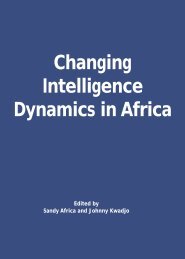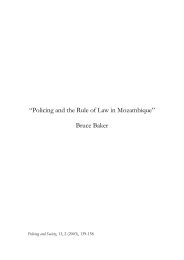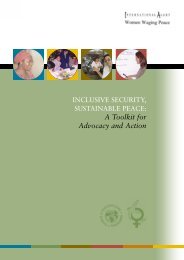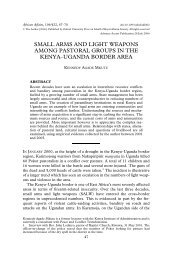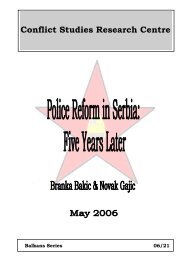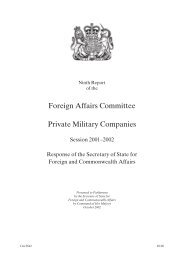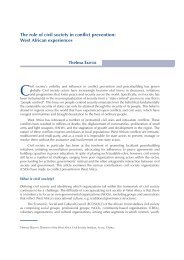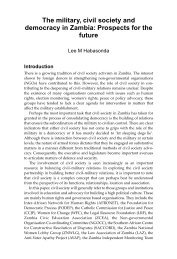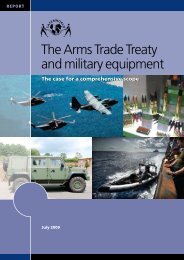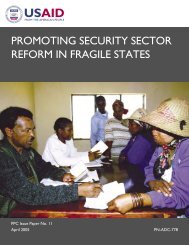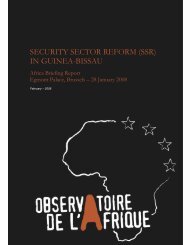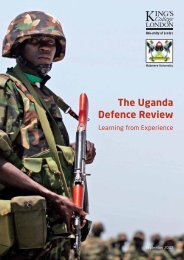AFGHANISTAN'S ELECTION CHALLENGES
AFGHANISTAN'S ELECTION CHALLENGES
AFGHANISTAN'S ELECTION CHALLENGES
Create successful ePaper yourself
Turn your PDF publications into a flip-book with our unique Google optimized e-Paper software.
Afghanistan’s Election Challenges<br />
Crisis Group Asia Report N°171, 24 June 2009 Page 10<br />
Ali Ahmad Jalali, 69 alleged that some of the candidates<br />
have mental health problems, 70 and has generally made<br />
his support of Karzai’s re-election evident.<br />
On the technical side, the handover from a joint international-cum-national<br />
operation to solely Afghan<br />
institutions was fraught with budgetary and staffing<br />
difficulties. 71 Onze report in 2006 stated: “it could be<br />
said that the IEC and IEC(S) right now are in crisis”,<br />
72 describing inadequate facilities and little direction.<br />
The chief electoral adviser describes the period<br />
until mid-2008 as a “funding graveyard... the lack of<br />
investment was a tragedy for Afghanistan and we<br />
73<br />
can’t afford to have it happen again”.<br />
Both the Afghan government and donors showed little<br />
interest in laying early groundwork to ensure strong<br />
electoral institutions and a sustainable electoral framework<br />
despite grand benchmarks in the 2006 Afghanistan<br />
Compact that the IEC would “have the high integrity,<br />
capacity and resources to undertake elections in an<br />
increasingly fiscally sustainable manner by end-2008”. 74<br />
International disinterest may have been due to the $15<br />
million overrun of the 2005 polls, 75 partly attributed<br />
69 See “FEFA is concerned over the comments made by the<br />
head of the Independent Election Commission on the criteria<br />
for the Presidency and regards such statements in breach<br />
of IEC’s impartiality”, press release by Free and Fair Elections<br />
Foundation of Afghanistan (FEFA), 13 July 2008.<br />
70 He told a press conference when announcing final candidate<br />
lists: “There are people among the candidates that even<br />
if you are not a psychiatrist you would say take them to Ali<br />
Abad hospital [Afghanistan’s best known mental health<br />
institution]”. Sardar Ahmad, “41 candidates for Afghan<br />
presidential ballot”, Agence France-Presse, 13 June 2009.<br />
71 “After the dissolution of the Joint Electoral Management<br />
Body for the regulation of the elections whose budget was<br />
provided by the international community, the Ministry of<br />
Finance set aside 30 million afghanis (approximately U.S.<br />
$600,000) for the expenses and general activities of the<br />
Commission in the first year after its founding. After the<br />
establishment of the Commission due to the lack of necessary<br />
budget and inadequate pay, the Commission lost many<br />
of its qualified elections staff and its activities in the provinces<br />
declined”. “Statement of the Independent Election<br />
Commission regarding the determination of the date for<br />
holding the presidential and provincial council elections”,<br />
30 January 2009, p. 6.<br />
72 Cook and Finn, op. cit., p. 25.<br />
73 Crisis Group interview, Margie Cook, ELECT chief electoral<br />
adviser, Kabul, 28 May 2009.<br />
74 The Afghanistan Compact, January 2006. It further committed<br />
to: “the Government of Afghanistan contributing to the<br />
extent possible to the cost of future elections from its own<br />
resources”.<br />
75 “Voter Registration and Elections 2004 and 2005”, overview,<br />
UNDP, p. 2. The final cost of the National Assembly<br />
and provincial council elections was $172 million.<br />
to a much extended count process, which made it hard<br />
to close off one project and begin the next. This deficit<br />
was slowly met over the following two years, in<br />
part by selling off election equipment, which then had<br />
to be replaced, a false saving at best. Meanwhile,<br />
many of the most experienced staff left as salaries<br />
plunged. 76 By April 2007 offices had been established<br />
in only 29 of 34 provinces. 77<br />
Four of the seven current election commissioners are<br />
new appointees since 2005 78 and for many staff 2009<br />
will be their first substantive experience of an electoral<br />
process, with ability varying widely between provinces.<br />
While there have been some capacity-building programs<br />
in the intervening years, early and sustained efforts<br />
were not made to meet the challenges that lay ahead,<br />
particularly given the complexity and scale of the<br />
provincial council elections. Even getting salaries to<br />
field staff has been difficult, with many going unpaid<br />
for weeks or even months. The voter registration<br />
process went more smoothly than predicted although<br />
data management and retrieval of materials from the<br />
field highlight areas that require greater focus and<br />
coordination. There have also been persistent allegations<br />
of nepotism and partisanship in hiring practices, many<br />
by those who were excluded. Recruitment practices<br />
and staff conduct should be transparent and accountable.<br />
Every effort must also be made to ensure staff<br />
and appropriate facilities and equipment are retained<br />
for 2010 and beyond.<br />
2. 21The Electoral Complaints Commission<br />
The ECC is an ad hoc body, first created in the 2005<br />
Electoral Law, and meant to exist only over electoral<br />
periods, completing its work within 30 days of the<br />
certification of results. Because the 2005 Electoral<br />
Law has yet to be replaced, it still consists of three<br />
international appointees of the UN as well as two Afghan<br />
commissioners: one appointed by the Afghanistan<br />
Independent Human Rights Commission (AIHRC)<br />
and the other by the Supreme Court. This separate,<br />
large and expensive electoral appeals body – costing<br />
76 Similarly, after the 2004 polls every Afghan election<br />
commissioner and many senior staff left. Cook and Finn,<br />
op. cit., p. 21.<br />
77 “Elections White Paper. Supporting Feasible, Sustainable<br />
and Affordable Elections in Afghanistan”, Election Working<br />
Group paper for JCMB V, April 2007, p. 2.<br />
78 “The legal mandate of the IEC commissioners described<br />
in [presidential] decree 21 of 2005 expired on 17 January<br />
2008. Although this issue was flagged to the government<br />
prior to the expiration, it was not until 18 May 2008 that the<br />
President issued another decree appointing a new board of<br />
commissioners”. ELECT Annual Project Report 2008, p. 14.



